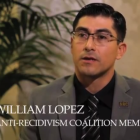
Interview: Leaving Violence Behind
|
Since getting out of prison Xavier McElrath-Bey has been helping Chicago youth leave their violent lives behind.
Juvenile Justice Information Exchange (https://jjie.org/tag/journeys/)

Since getting out of prison Xavier McElrath-Bey has been helping Chicago youth leave their violent lives behind.

Laura had turned her first trick on February 1, 2000, for a pimp named Quinn.

The lack of culturally relevant services and possible racial discrimination all pose hindrances to LGBTQ young people's healthy development and success.

When he was a teenager growing up on the mean streets of South Central Los Angeles, Prophet Walker hardly seemed destined for success.
His mother was a heroin addict, and his neighborhood was filled with racial strife between blacks and Hispanics. But this is a story of hope and redemption, not despair, one that links the disparate worlds of Los Angeles’ ghetto neighborhoods with the glamour of Hollywood. It is the story of how Walker, with the help of movie producer Scott Budnick (“The Hangover”) and his own fierce determination, overcame his difficult circumstances and transformed his life into a success story.

After losing his brother to gang violence, during his incarceration William Lopez began to turn his life around through education.

Cindy Mathers found herself at a loss. Tasked with engaging a group of young teenage boys identified as at-risk of transitioning poorly to secondary school, the community health nurse, who works with aboriginal communities in West Gippsland, Australia, was worried that conventional talk-based techniques would fall short with the boisterous boys. DRUMBEAT, a group program that uses hand drumming to create a fun, safe space for social learning and self-reflection, provided her with a solution.

The New York Bureau recently compiled profiles on three young New Yorkers with one thing in common: a history of time spent in lock-down facilities.

One of the questions I have pondered since my release from prison is when and where to share my past with people in my life, both personally and at work. Sometimes it is an easy decision. When I started writing for JJIE it was hoped that my point of view, based on my experiences, would offer a voice not usually heard in discussions about justice. This week I was working in a diversion center, talking to some of the residents about communications skills. One of the guys commented that I needed to work with the staff, since the inmates had little conflict or trouble with one another.

WASHINGTON, D.C. – Twenty-year-old Edward Ward, a sophomore on the honor roll at DePaul University, tried to describe to U.S. Sens. Dick Durbin (D-Ill.) and Al Franken (D-Minn.), the only senators left in the room by the time he spoke on Capitol Hill Wednesday, what it was like to grow up in his neighborhood on the west side of Chicago. “When I was 18, I witnessed a complete stranger's killing mere feet from me in a neighborhood restaurant," Ward said before the Senate subcommittee. "I was stopped by the police a few years ago. I saw them train their guns on me until I could show them the item in my hand was only a cell phone.”
Things didn’t get much better at high school, Ward said.

"What happened in your life that made you a passionate advocate for kids?" When Jane Hansen, Information Officer for the Georgia Supreme Court, asked me this question last week during an interview, I thought, "Whoa -- the question assumed something happened to me." Now I am paranoid -- what does she know that I don't? I have known Jane going way back to my days as a parole officer when she was a reporter for the Atlanta Journal Constitution -- she has a keen sense of things. This "happening" resides in the recesses of my mind, something that rises to the surface from time to time when triggered by an event, song, or a question.